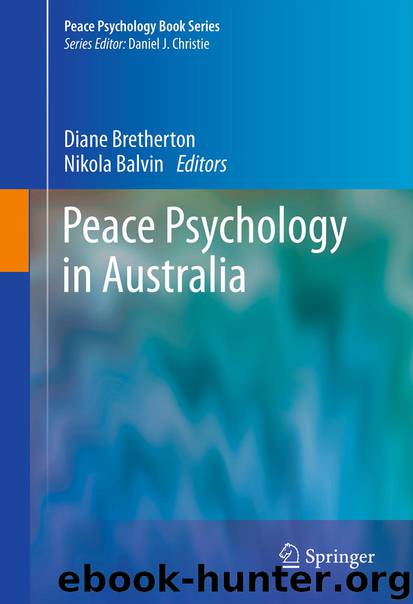Peace Psychology in Australia by Diane Bretherton & Nikola Balvin

Author:Diane Bretherton & Nikola Balvin
Language: eng
Format: epub
Publisher: Springer US, Boston, MA
11.2.2 Structural Differences Between Med/Arb(Diff) and Standard Mediation
Having explored differences between the opening and discussion phase models, I now turn to reflect on aspects of the site- and type-specific models of turn-taking. Between-site model comparisons suggested that the opening and discussion phase models of turn-taking in the two med/arb(diff) sites were statistically similar, as were the two models associated with the two standard mediation sites. On the basis of these between-site comparisons, it was concluded that the four-site turn-taking dataset could be simplified into two ‘type’ categories – med/arb(diff) and standard mediation.
Analyses revealed a number of phase-specific model differences between the med/arb(diff) and standard mediation samples. The overall conclusion of these analyses was that med/arb(diff) mediation is structurally different from standard mediation. Descriptively speaking, the med/arb(diff) and standard mediation samples differed in relation to turn-taking regularities in the opening phase, the proportion of turns and talking-time that occurs in the discussion phase and in private caucus, and the number of private caucus sessions.
The model selection and model description undertaken in this research provides additional strong support to the emerging theoretical understanding of mediation derived from research conducted by Garcia (1991), Greatbatch and Dingwall (1997) and McGillicuddy et al. (1987). McGillicuddy et al.’s field research, for example, comparing the frequency of mediator and disputant behaviours in med/arb(same), med/arb(diff) and standard mediation, revealed that disputants displayed more hostile and contentious behaviour towards each other in standard mediation than med/arb(same), while those involved in med/arb(diff) were in between and not significantly different from either. In addition, they revealed that mediators were less actively involved in med/arb(diff) than either standard mediation or med/arb(same). These findings led them to suggest that disputants are likely to engage in more conciliatory behaviour when they fear losing their role in determining an agreement, and that mediators are likely to be less actively involved in med/arb(diff) than med/arb(same) or standard mediation because they feel disempowered by the knowledge that someone else will adjudicate settlement if consensual settlement is not achieved.
Garcia’s (1991) conversation analysis research developed these ideas further by considering sequential aspects of interaction in med/arb(same) mediation. She revealed that med/arb(same) mediators are very influential in inhibiting between-party interactions throughout the intervention, but particularly in the opening phase. This finding appeared to support elements of McGillicuddy et al.’s (1987) research in that med/arb(same) mediators were shown to be very actively involved in the process. In addition, Garcia recognised that mediator turns operate to interrupt the adjacently paired utterances of disputants, and that this serves to inhibit the establishment of an argumentative dynamic between disputants. On the basis of these findings, Garcia proposed that the effectiveness of mediation may derive from a mediator’s success in structurally inhibiting arguments between disputants.
Further advancing mediation theory, Greatbatch and Dingwall’s (1997) conversation analysis focused specifically on patterns of interaction that occur in the discussion phase of standard mediation. Though they did not present a phase-specific analysis, they did reveal that direct between-party interactions are common in standard mediation and that disputing parties, as opposed
Download
This site does not store any files on its server. We only index and link to content provided by other sites. Please contact the content providers to delete copyright contents if any and email us, we'll remove relevant links or contents immediately.
Rewire Your Anxious Brain by Catherine M. Pittman(18638)
Talking to Strangers by Malcolm Gladwell(13342)
The Art of Thinking Clearly by Rolf Dobelli(10444)
Mindhunter: Inside the FBI's Elite Serial Crime Unit by John E. Douglas & Mark Olshaker(9313)
Becoming Supernatural by Dr. Joe Dispenza(8196)
Change Your Questions, Change Your Life by Marilee Adams(7753)
Nudge - Improving Decisions about Health, Wealth, and Happiness by Thaler Sunstein(7689)
The Road Less Traveled by M. Scott Peck(7592)
The Lost Art of Listening by Michael P. Nichols(7487)
Mastermind: How to Think Like Sherlock Holmes by Maria Konnikova(7314)
Enlightenment Now: The Case for Reason, Science, Humanism, and Progress by Steven Pinker(7305)
Win Bigly by Scott Adams(7183)
The Way of Zen by Alan W. Watts(6594)
Daring Greatly by Brene Brown(6501)
Big Magic: Creative Living Beyond Fear by Elizabeth Gilbert(5753)
Grit by Angela Duckworth(5598)
Ego Is the Enemy by Ryan Holiday(5412)
Men In Love by Nancy Friday(5231)
The Laws of Human Nature by Robert Greene(5170)
